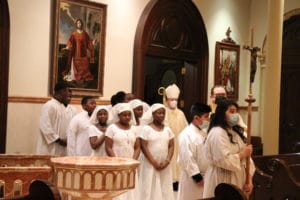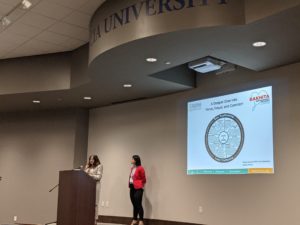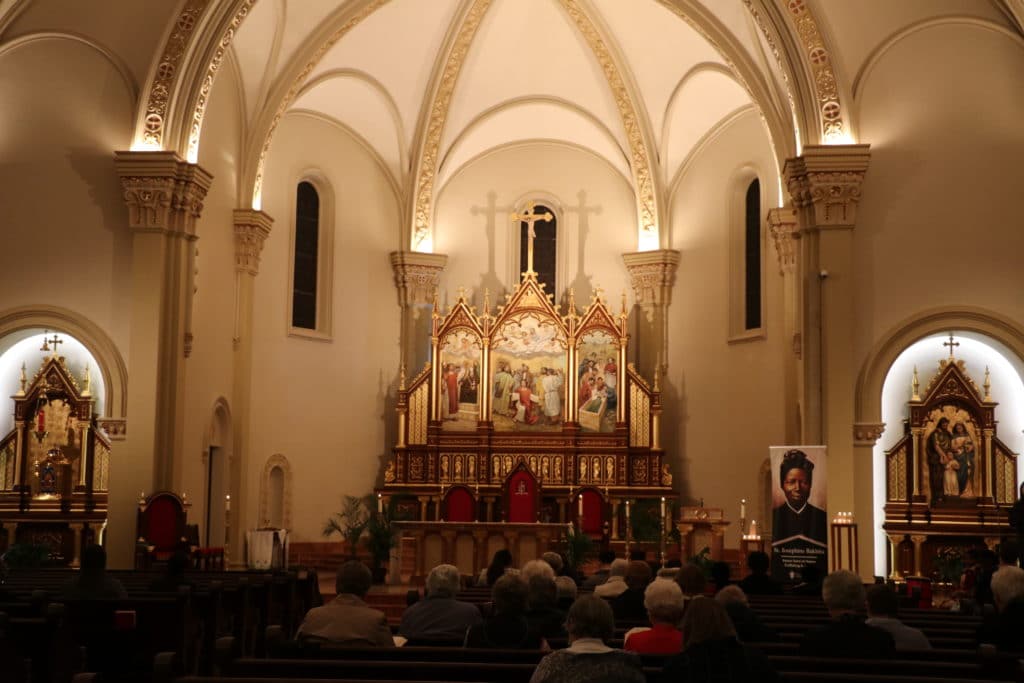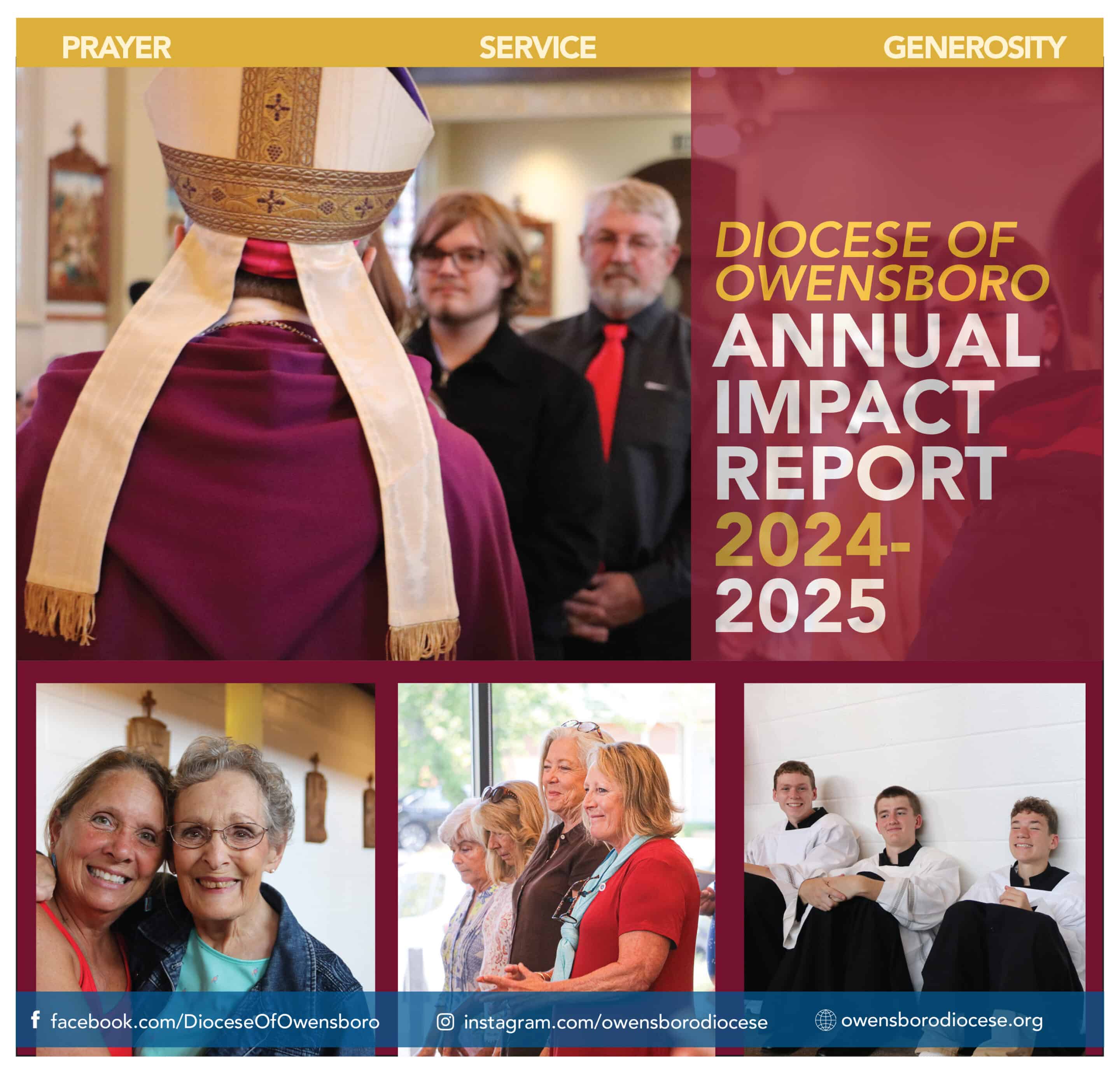
The Congolese Choir of Holy Spirit Parish in Bowling Green lead a traditional song during the Feb. 8, 2022 Mass celebrating the memorial of St. Josephine Bakhita and the Day of Prayer and Awareness Against Human Trafficking. ELIZABETH WONG BARNSTEAD | WKC
With presentation and Mass, human trafficking awareness the focus of Feb. 8 events
BY ELIZABETH WONG BARNSTEAD, THE WESTERN KENTUCKY CATHOLIC
Human trafficking, contrary to popular belief, does not usually start with being kidnapped by a stranger.
In fact, it is more likely to start with a family member, a romantic partner, or someone else the trafficked person already knows and trusts, according to Amy Nace-DeGonda, assistant program director for the Bakhita Empowerment Initiative of Catholic Charities of Louisville.

Youth from Holy Spirit Parish in Bowling Green participate in the procession with Bishop William F. Medley at the start of the Feb. 8, 2022 Mass celebrating the memorial of St. Josephine Bakhita and the Day of Prayer and Awareness Against Human Trafficking. ELIZABETH WONG BARNSTEAD | WKC
On Feb. 8, 2022, she and Heidi Reyes-Taylor, case manager for the Owensboro satellite location of the Bakhita Empowerment Institute, gave a presentation at Brescia University in Owensboro on commercial sexual and labor exploitation within human trafficking.
The day coincided with the International Day of Prayer and Awareness Against Human Trafficking, as well as with the feast of St. Josephine Bakhita, who lived in the 19th and 20th centuries and, after living for many years as an enslaved person, eventually became Catholic and entered the Canossian Sisters.
“An abuser is really smart,” said Reyes-Taylor during the talk, which was presented in-person and via livestream. “They are able to ‘learn’ a person and find how they can use them.”
Nace-DeGonda explained that people can be trapped into being trafficked through “force, fraud, or coercion.”
Force can be perpetrated through physical restraint, physical violence or physical harm. Fraud is the use of false promises as a form of grooming, to ensure compliance.
Nace-DeGonda said an example of coercion would be for an abuser to demonstrate through psychological manipulation that “if you don’t do what I want you to do, I will physically harm you or someone you love.”
Unfortunately, coercion is the “hardest to prove,” said Nace-DeGonda, since “you cannot take the fear someone causes you, out of your body, and show it to someone.”
Reyes-Taylor explained that Bakhita Empowerment Initiative discourages the public – as in those who are not professionally trained to work with human trafficking survivors – from trying to identify human trafficking via “red flags.”
She said misinformation “red flags” like stories of a mysterious white van at the curb or finding a rose on one’s windshield, are often shared on social media in a misguided attempt at stopping human trafficking. The fact is, she said, these stories “can create a false narrative,” and move the focus away from the real issue.

Amy Nace-DeGonda and Heidi Reyes-Taylor speak at Brescia University on Feb. 8, 2022, on the topic of commercial sexual and labor exploitation within human trafficking. ELIZABETH WONG BARNSTEAD | WKC
Spreading misinformation like this can also perpetuate stereotypes, create unnecessary fear, and is ultimately harmful to actual trafficking survivors, she said.
So how can the public raise the right kind of awareness about human trafficking?
Nace-DeGonda and Reyes-Taylor suggested learning about supply chains, since many companies use labor exploitation at some point; donating to legitimate human trafficking awareness agencies; attending events that promote human trafficking awareness; sharing accurate information; and supporting fair-trade, sustainably-sourced businesses – especially local businesses.
Later, at 6 p.m. that evening at St. Stephen Cathedral in Owensboro, Bishop William F. Medley presided at a Mass celebrating the memorial of St. Josephine Bakhita and the Day of Prayer and Awareness Against Human Trafficking.
In his homily, Bishop Medley said he realized that St. Josephine Bakhita was born only a few years before his grandparents.
“So that’s not that far removed from our history,” he said. And even today, human trafficking itself persists across the world.
The bishop said human trafficking may sound like a more sophisticated title, “but it means the same thing as slavery: one human being is exploiting another.”
The Mass also featured a presentation by Reyes-Taylor about the work of the Bakhita Empowerment Initiative, and music by the Congolese Choir of Holy Spirit Parish in Bowling Green.
To learn more about the work of the Bakhita Empowerment Initiative, visit www.bakhitaempowerment.org.

St. Stephen Cathedral hosts the Feb. 8, 2022 Mass celebrating the memorial of St. Josephine Bakhita and the Day of Prayer and Awareness Against Human Trafficking. ELIZABETH WONG BARNSTEAD | WKC

